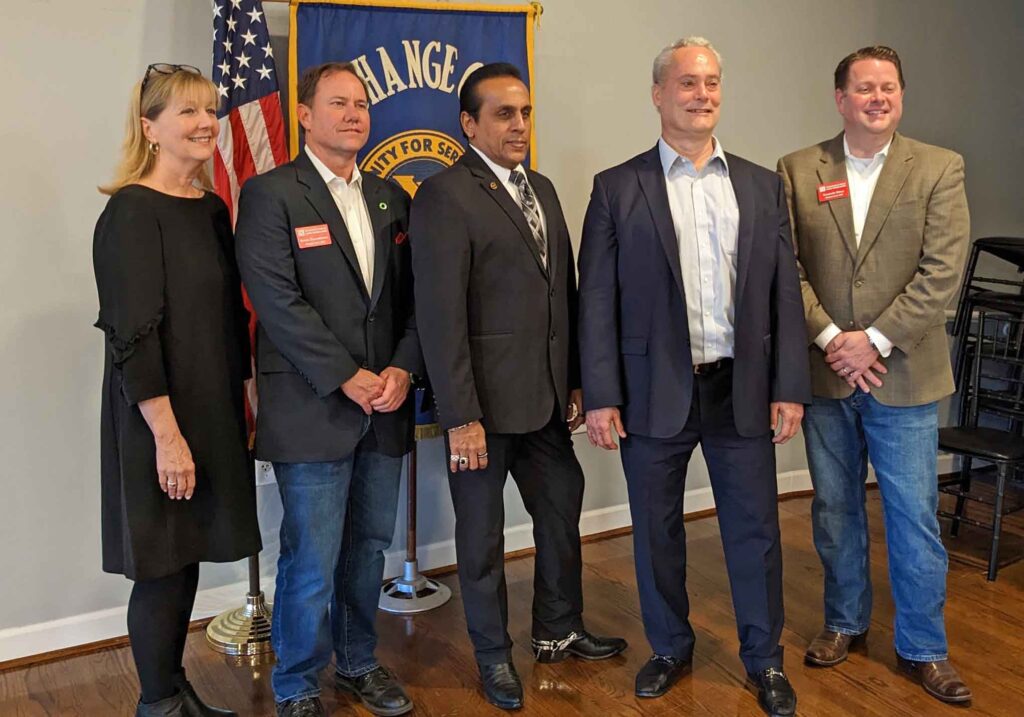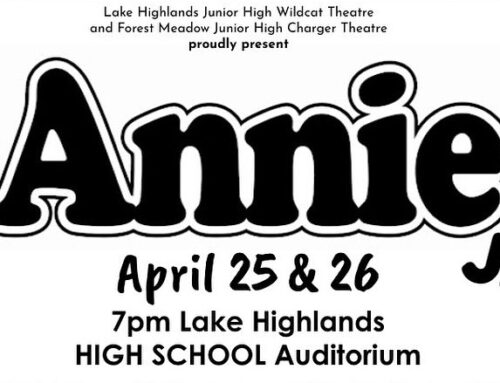
Kathy Stewart, Brian Hasenbauer, Sirrano Keith Baldeo, Chris Carter and Ken Riney. Photo courtesy of Jeffrey Huebner.
The Lake Highlands Exchange Club hosted a District 10 city council candidate forum Friday for members. Kathy Stewart, Brian Hasenbauer, Sirrano Keith Baldeo and Chris Carter, all vying to succeed Adam McGough at city hall, participated.
The candidates answered multiple questions, including the following three. The full session may be viewed on YouTube below.
Exchange Club’s Ken Riney: In some instances, short term housing rentals in Lake Highlands, on platforms such as Airbnb and VRBO, have been used for organized parties, leading to complaints from surrounding residents about noise, parking and even criminal activity. Do you believe STRs should be regulated, not regulated or outright banned? If you believe they should be regulated, what type of regulation do you believe should be put in place?
Brian Hasenbauer: I’ve come out and openly said we need homes, not hotels, in our neighborhoods. I do believe we have an issue that our housing stock is being sold to investors, and that’s increasing the price of housing for everyone. It’s great for selling, not so great for buying. STRs have caused fear in our neighborhoods. I was talking to a neighbor the other day, and they said they hear cars in the morning, cars at night, at 2 or 3 in the morning. They said someone threw things in their pool, and they can’t get a response from the city. We haven’t figured out how to regulate them yet, but we certainly know they need to be registered if they’re in that zone that is zoned for them. They also should have to have a ranking on Airbnb and VRBO, and that way if they’re getting only two stars, they can be kicked off so they’re not allowed to operate in the city of Dallas. We do need to allow longer-term rentals, though, so if it does exceed 30 days and you need temporary housing during a remodel, that needs to be allowed, even in residential areas.
Sirrano Keith Baldeo: When you structure a community, you have to have your commercial, your business and your residence. I think people pay a lot of money for their homes, and they deserve to have their quietness to live in those homes. I don’t need a long speech on this. My vote would just be no.
Chris Carter: You guys do not want short term rentals; therefore, we will not have short term rentals. It’s as simple as that. But also, you guys, the vast majority, don’t want apartments built all over this district, but we’re getting it, at the Lake Highlands DART station, we’re getting a homeless shelter over on Greenville Avenue and LBJ. We’re going to be getting apartments over here at the Northlake Shopping Center. None of us want this. None of us are being consulted on this. You’re supposed to have 30 days’ notice for a public meeting on these items, and we’re not getting it. If I’m elected, you will be notified, and you and the other homeowners will be making the decision on this. And I will tell you this right now — if I’m elected there will be no more apartment building in this district for two years. We’re shutting it down, because this complex going in over here at Lake Highlands DART near where I live will be a traffic disaster, and all the homes being built at the old Hollywood Door Company that are going to be coming onto White Rock Trail are going to make it impassable in the morning. It takes ten minutes to get through that light now. It’s going to take a half an hour to get through that light in the morning once all this comes online. So, my answer to all of this development is: we’ve had enough of all of this for right now. We’ve got a lot on our plate, and we need to digest it. So, we’ll be shutting it down going forward.
Kathy Stewart: Going back to the question that was asked, I would say this: I have visited with many of you over the last several months, and yes, we have problems with short term rentals all over District 10 — north of LBJ, in Whispering Hills and in Moss Haven and over off of Rolling Rock. At this point I would be in favor of protecting our traditional residential homes and neighborhoods and saying no to short term rentals in neighborhoods. I know that regulation will be discussed, and the problem with regulation in the city of Dallas is the enforcement of that regulation. We always have trouble with enforcement. We have all these ordinances, including a promoters’ ordinance that I’m not sure is being enforced. Those were problems we were having in Uptown, so we began to limit the promoters. So that is the problem with regulation — you’ve got to have the staff to enforce it, and I’m not sure that that is available. So at this point I am against that.
On the apartment issue, the apartments being built at the Lake Highlands Town Center are being built under a planned development, a zoning document that was worked out and agreed to and everybody had the ability to give their input to that many years ago. It just has taken a really long time for those apartments to get built, so it might look like a recent thing, but all of that was worked out, maybe when Bill Blaydes was a councilmember.
Riney: The Dallas Police Department continues to have an attrition crisis, with the number of police officers decreasing last year for the second year in a row and 500 officers less than they had approximately ten years ago, which the department blames for rising response times and increased violence. In your opinion, what is the root cause or causes of this attrition? What recruitment and retention methods have proven ineffective, and what recruitment and retention methods should be implemented to solve this crisis?
Baldeo: I think the biggest problem with the police department is the very low morale. We are investing another $41 million in this budget and another $45 million in another budget added to the police department. And the department says it’s not that we don’t have the money. It’s that we can’t find the people. I speak with officers in the street all the time, and the problem is they don’t feel the job is worth it. They don’t feel welcome. They don’t feel appreciated. There were programs in New Jersey when I was there, there were events and activities to make officers feel good. Under my administration, officers will be labeled as a defense force under me so as to be treated differently. But you have officers telling me that they don’t feel welcome, so they’ll grab their pension and leave. It’s not an attractive job. We did a study for almost $400,000 that said the problem was not more officers, the problem was effective and efficient policing and registering of the crime. $400,000 told us that it wasn’t more cops, it was the department wasn’t effective and efficient enough. We have a big turnover right here in northeast. We shouldn’t have that. We should have somebody who can step in and say, “Look, what do we do here?” This chief has got to go if I’m in there. He’s ineffective, he’s inefficient, and he doesn’t know how to organize his team.
Carter: Guys, this is real simple. When you want to recruit and retain talent, you’ve got to pay them. A starting police officer in the Dallas Police Department makes around $60,000. In Frisco, Garland and all the outlying cities, they pay them approximately $80,000. So they go through our police academy, they come out and they get poached. We’ve got to give these guys a raise. It works out to approximately $20,000 across the board for the rank and file. That comes out to somewhere between $60 and 70 million. Divide that by 400,000 households in this city, and it comes out to around $150 per household per year. Would you pay $150 to have a high morale, elite, robust police force? I think you would. But the first thing I’m going to do when I get down there is carve this out of the budget. This is tasked to us by the city charter —the police, sanitation and roads. We are not tasked with diversity, equity and inclusion programs, so that stuff’s got to wait while we get our priorities put in order. And that’s what I’m going to do. This is not the intractable problem that T.C. Broadnax tried to make it out to be. It’s a real simple problem. We’re going to pay them more money.
Stewart: I have had the privilege of working with command staff at northeast and central, and I’ve had a good relationship with Dallas Police Investigation. I will support those leaders, and they work on this issue. I trust their judgment and their expertise. They are working on this. They know it’s an issue, and I believe we will get this figured out. But I will support them. I’m not going to try to solve it for them. I’m not going to assume I know more than them. I will support them and work with them, and I don’t know that you can give that kind of a raise, or say that you’re going to do that, and be able to deliver on it. You would have to convince other council members to agree with that and vote for it, and I think that would be quite challenging.
Riney: In the past six months, a 16-year-old boy was murdered outside his apartment complex, a 39-year-old man was found murdered on the street outside an apartment complex, and a body was found in the trunk of a car that had been towed from an apartment complex. These are not crime statistics from Chicago or even the Vickery Meadow area. Rather, they are stats from the heart of Lake Highlands and the area of Walnut Hill and Audelia and the high school. Why is this happening and how can it be stopped?
Hasenbauer: Well, going back to talking about our public safety and the need to have additional police officers, being able to have more police officers, not just patrolling, but being able to work with apartment managers, being able to work with our high schools, being able to just have more resources. One thing I know Councilman McGough has been for is having more SROs on every school campus, because school safety is very important, and our elementary schools do have an issue where they possibly could have a need for an SRO there. So in terms of what’s happened in apartments, we do have some bad apartment owners and we do have bad apartment managers. Councilmember McGough did a wonderful job as a community prosecutor, making sure that those bad actors were vetted and taken out of the system and prosecuted. So we do have other apartment owners that do a wonderful job. They care about their tenants and create a nice, safe environment, and I do believe we need to differentiate the good from the bad and use every tool we have in the city of Dallas’ repertoire to come down on those bad apartment owners. So I think that’s where we need to focus, is making sure we end up having those conversations, having the police code community prosecutors and a collaborative effort to be safer in the apartments.
Baldeo: I get this response over and over again, but what it basically means is we want to police our way out of all of our problems, and it never works out. From California to New York, it’s not going to work. We’re not on a reservation. We cannot police our way. So here’s the answer: I was a president of a newspaper, I was friends with one of the mayors, and we implemented a program of environmental social psychology is when we change the environment, and you put a leader in there that is going to be respected by the people, and you go in there and they see you, that psychology brings the respect. Then you implement the policies and the programs and the training, and you show this is happening, mostly in the minority community. These guys (pointing at the other candidates) are never going into the minority community. There’s a map, I’ve heard, to avoid my community, and that’s where the crime is. I can walk in wearing a suit, and I hear, “Hey mister, are you famous?” I can get that respect. And I can bring that environmental philosophy to them and say, “Look, we’re not going to have this anymore.” Three murders. And besides that, in 2021 we had the Labor Day murders. Three people dead. They didn’t show up. Seven people in 39 days in the Black community, and it went beyond the news. My leadership will take me in there with a team that they’ll know we care. You cannot leave people hungry and alone. The minority community, I think, is going to be saying that. Leadership has to be there.
Carter: The question, as I understand it, is one of deterrence. When I was growing up here in the 1970s, the Dallas police cars had a 12-gauge shotgun strapped to the dashboard where everyone could see it, and a lot of you guys probably remember that. Back in those days, not only did we respect our police officers, we feared our police officers, and that was a big deterrent to crime. Now, with the left-wing Dallas City Council, when you advocate for law enforcement, you’re called a racist. I’ve been called a racist when I was defending our historical monuments. It doesn’t phase me one bit. Kathy’s talking about how she was the executive director of the Uptown PID, and they lowered crime. Have any of you guys been down to Uptown recently? It’s the worst crime they’ve ever had. I’ve got friends who are moving their children out of Uptown, because it’s become so dangerous. This is a matter, once again, of leadership. The courage of your conviction, that I’m going to go down there, and I’m going to advocate for the police, and I’m going to advocate for deterrence. If you talk to a Dallas police officer, they will tell you that they look at the Dallas City Council as one of their biggest adversaries, because they don’t have their back. I will have the back of the police, and we will have a strong, robust deterrence that’s not going to cost us tens of millions of dollars.
Stewart: I have worked with the police and this neighborhood on these kinds of issues, and one of the most important things you can do, and you’re right Mr. Baldeo, is go into the community where there is crime and work with those people. Work with them so that they begin to trust you, so that then some of our neighborhood police officers can come in and get some of the information they need about how and where and when the crime is happening. So you need to build relationships with the property managers and with the residents, and that means bringing in an event, like pizza around the pool, and you have city resources there and county resources there, and you knock on doors. Literally, I have knocked on the doors of many apartment renters in this neighborhood, low-income families, and encouraged them to come out, come to the pool, come have some pizza, come kick the soccer ball and get to know your neighborhood patrol officers, the police officers assigned to this neighborhood. So we need to do more and more of that. We also need to put together what we used to call a government action team, and that’s a monthly meeting with all your resources — your community prosecutors, your Dallas police officers, your code compliance officers, your Dallas Fire — and you sit at a table and look at the properties that are an issue, and you start identifying what you can do for these properties.
Election Day is May 6. Early voting begins April 24.





